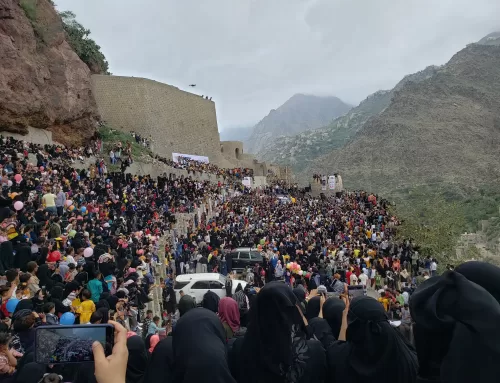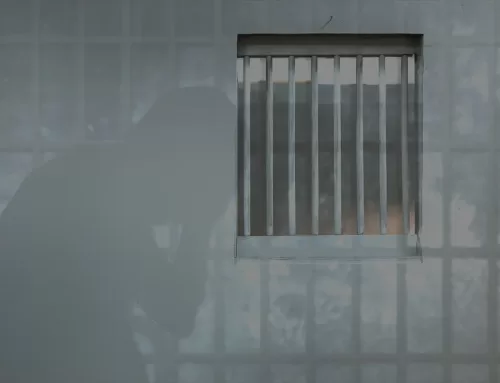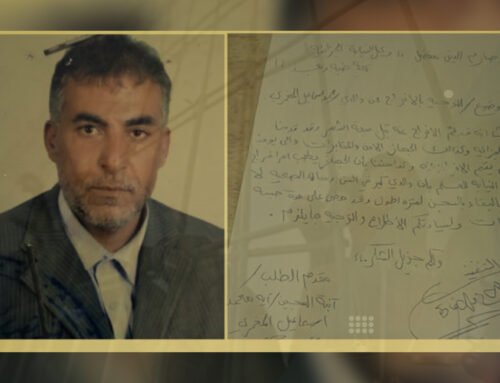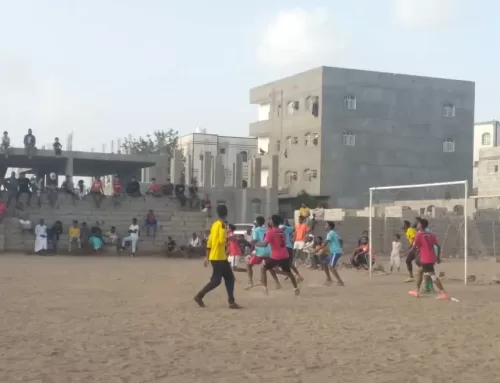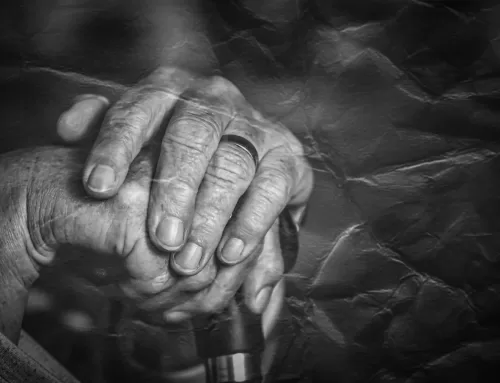“How The War Lengthened Our Journeys”
July 1,2021
Since 2015, domestic travel became a cause of concern to Yemenis due to the ramifications of the war which divided the country into several enclaves, each controlled by a warring party. This made it difficult to move and travel between different parts of the country, so much so, one felt as if travel was from one country to another.
I felt as if I were not in my country
I had this feeling while traveling to Sana’a and back. During that journey, I went through difficult moments, and saw disturbing sights and events. It was not my first trip but it was the roughest, and the most bitter.
My journey started from Shabwa province on the 3rd of September, 2020. At 9 a.m. I took a Hiace type bus with a group of fellow passengers.
The road was passable as we departed the city of Ataq, the provincial center. We traveled through the districts of Nisab, Markha, to Baihan, the last district of Shabwa province, where we stopped for lunch. Then we entered Ma’rib province, starting with the road linking the districts of Harib and Al-Juba. On a dirt road that had previously been asphalt-paved, it took us roughly two hours to go the distance; however, only half an hour was required to pass through.
We arrived at the Juba Junction, which is the road leading to Al Bayda province, which we passed through most of its districts until we reached Dhamar province. The semi paved road was rough with many potholes and diversions.
Government Checkpoints
Soldiers asked us for IDs when we passed by checkpoints affiliated to the internationally recognized government of President Hadi. They posed frequently asked questions at every checkpoint we passed: Where are you from? Where are you going? And what would you do in Sana’a? Soldiers were checking travelers from the northern provinces more strictly.
On the Juba-Al-Bayda road, my attention was caught by hundreds of large vehicles parked by the side of the road. Most of them were tankers, transport trailers and trucks that extended from the beginning of the Juba junction. I watched the drivers of these vehicles laying down by the road side, some were sleeping underneath their vehicles, others were doing some repairs to their vehicles, while others were eating their lunch.
This scene was repeated until we reached the post leading to the Qania-Al-Bayda road, where two soldiers affiliated to Hadi government stopped us and took our ID cards before they quickly returned them. This place was the last stronghold of the Hadi government forces, after which the road seemed almost empty.
Here is the first Houthi checkpoint
It was 4 p.m. when the driver told us that here starts the area controlled by the Ansar Allah (Houthi) group. In this area clashes erupt suddenly, especially at nightfall.
We arrived at the first Ansar Allah (Houthi) checkpoint. They checked our ID cards. This was repeated until we reached a checkpoint in the location between Qania and Affar (Al-Bayda) called Abu Ahmed post, where the soldiers took our ID cards and asked us all to get out of the car. They asked us to wait until we get called.
Adjacent to the road, there was a small room built of bricks, in a random fashion. There were three armed men, of no more than 20 years of age, sitting in the room. One of them was holding our IDs in his left hand and in his right hand he was holding his phone. Then he started calling us one by one.
He was entering our personal data from the ID cards to his phone and then asking us several questions: Where are you from? Where are you going? Why do you want to go to Sana’a? What is your phone number? When he finished copying data he returned our IDs, and he was done with us. It took about an hour. The driver told me that they do this and send the data to the operations unit to give permissions to travel in the areas under their control, and that’s called “reporting”.
After we got out of there, the road was clear and we were not subjected to any further stops until we reached Rada’a city in Al-Bayda province. We stopped there for dinner. Then we continued our way through Dhamar province until we reached Sana’a at 2:30 a.m..
Preparing to go back
After the training workshop was over on the 10th of September, I was preparing myself to go back to Shabwa, when on the next day, a Friday, I received a call from a friend of mine telling me that the Al-Bayda-Marib road was cut off due to ongoing clashes there between AnsarAllah (Houthis) and the forces of President Hadi’s government. My friend also told me that many travelers could not get through, and returned back without reaching their destination. He urged me to look for another way.
I called the bus driver who I came with. He confirmed the news and told me that he is also stuck in Sana’a, and many passengers were not able to depart. For two days I kept asking and inquiring about alternative routes. I had two options: to either take the Sana’a-Al-Jawf-Ma’rib-Shabwa road, or the Sana’a-Taiz-Aden-Shabwa road. After consulting many people, I decided to choose the first route.
New ways
Sunday, September 13th: I packed my bag. It is my travel day. I don’t know why I had a strange feeling when I was arranging my clothes. I said to myself I’m just worried because I’m going down this road for the first time.
I found a bus driver from Shabwa, who intended to take the Al-Jawf-Marib-Shabwa route, and I decided to go with him. I started a journey that I hoped would be less strenuous than previous trips to and from Sana’a. I have always felt happy when I traveled because by nature I love to travel, I yearn to the beautiful scenery on both sides of the road, the fresh air, and hearing the voice of Fairuz. I even miss the peddler of the strawberry that I always buy for my mother.
The trap of Naqeel Bin Ghaylan
It was 7:30 a.m. when we stopped at a checkpoint belonging to Ansar Allah (Houthis) in Naqeel Bin Ghaylan between Sana’a and Nihm. One of the gunmen took our ID cards and then asked the driver to pull over by the side of the road. There were a lot of parked vehicles and most of them were taxis. We waited for ten minutes and no one came to us so the driver got off to inquire about the reason for the delay.
Minutes later, the driver and the gunman came back. The gunman told us that travelers from the provinces of Ibb-Taiz are prohibited from traveling and from leaving Sana’a. He kept the IDs of passengers from Ibb or Taiz with him, and asked them to get off the bus. Most of the travelers with us were from Ibb and Taiz and we had to wait.
They returned my ID card, with those of two others from Al-Jawf province and another person from Al-Mahwit province, while they kept the IDs of the travelers from Ibb and Taiz.
There was an armed man named Abu Abdullah, who seemed to be the supervisor of the security post. He was sitting on a rock in the middle of the road. Everyone went to him and begged him to return their cards and let them travel, but he refused.
You are ISIS
The situation continued like this until 10 a.m., when another armed man called Abu Ammar came. He was more strict. Moving from one car to another, he ordered the drivers to continue their journey or to return to Sana’a, but most of the drivers refused to leave without their passengers. So he started to be more stern with them and rebuked them, which prompted some drivers to leave the place, along with some of the passengers.
Abu Ammar was standing in the middle of the road, and everyone was gathering around him, trying to give him justifications to convince him to allow them to continue their journey. His response was: “You are takfiri ISIS “Daish”, and you will not leave Sana’a”. He even refused the passage of women and children who were from Taiz and Ibb provinces.
The driver of the bus I was with decided to return to Sana’a, and I had to look for another car that would go to Ma’rib, from which I can then go to Shabwa, in another car. I found a double cab Hilux car. Accompanied by another passenger from Shabwa I went with it. We also had a traveler from Al Mahwit, another from Marib, and a ten-year-old child whose father had to send him with the driver of the car to Marib, hoping that he would join him if they would allow him and others to cross. He was from Ibb province.
We started our journey to Marib, and passed through all the checkpoints of Ansar Allah (Houthis) and no one spoke to us as if they knew that those leaving from the Nuqil bin Ghaylan point belong to provinces whose inhabitants were allowed to pass on Abu Ammar’s permission.
We passed the Nehm area and Fardhat Nehm post. The driver took the Al-Jawf Junction road until we reached the historic Baraqish area, where there was a small local market. We stopped there to pray and have lunch. There were dozens of travelers and Houthi fighters (Ansar Allah) crowding the restaurant, and we had no choice but to enter and join the crowd. After eating some food, we did not finish our lunch because there was an insect in the rice provided to us. We continued our way to Ma’rib.
Desert dangers
At one o’clock in the afternoon, we set off to Ma’rib via a desert road, which is the most vital and arduous road we have taken and will travel after that.
Moments after we moved, we spotted a taxi broken down. There was a family in it, so we stopped and got down to help them. We pushed the car back and forth. with its engine running, to no avail. It was stuck in quicksand. Our driver decided to move after he advised the other taxi driver to return to the nearest point to get help to have his car repaired.
The sun was in the middle of the sky in a subtropical region where the temperature at this time was above 35 degrees Celsius. The road was a desert road through a desert filled with sand. There were dozens of large transport trailers and trucks as well.
Our driver was going at a crazy speed so that the car wouldn’t get bogged down and stuck in the sand. Dust was blowing and getting into the car through its openings, so we chocked and started coughing. Along the way, I witnessed the suffering of the citizens as they traveled. I’ve seen broken cars and others that have got stuck in the sand, I’ve seen women, children and old people stranded on the sides of the road because their cars broke down or got bogged down in the sand.
People were forced to take this exhausting desert road to avoid the roads and places of clashes or escape from the long, winding roads where they may spend days until they reach their destination. Even drivers of large transport vehicles had to take this road.
I lost my bag
After about an hour and a half of traveling on a road that we were supposed to cross in less than an hour, we approached the end of the road. while the driver was maintaining his speed to avoid getting bogged in the sand, the car flew into the air and crashed back hard on the ground, but the driver continued on his way as if nothing has happened. I looked at the child Ibrahim next to me. He was terrified, so I asked the driver to slow down even if we dived into the sand. He pulled over and said, “Check your luggage. I am afraid that some luggage may have dropped off due to the violent impact of the car.”
I looked at the luggage and my bag was not there. I told them that my bag has fallen. “let’s go back to look for it, “I requested. The driver said, “I will not return, there is a lot of sand and I am afraid that the car will get stuck”. So, I decided to go back on foot.
After I walked for a little while, a car came along and stopped. Its driver asked me: “Have you lost a bag?” I told him: “Yes.” He said: “it is with us.” I grabbed the bag and pulled it up to the car. When we decided to continue we saw a tire had exploded.
We took out the spare tire and it had no air, so we sat next to the car waiting for someone to help us. Each of us was sitting alone trying to hide the traces of travel fatigue. Two whole hours passed in vain. Everyone who passes by apologized for not giving us his spare tire because he too was taking a treacherous road.
The weather was hot and the wind was strong, stirring dust that blinding our eyes, we ran out of drinking water, communication networks were cut off in the place, and there were mirage waves pervading the sand, turning it into a sea of raging heat.
I was sitting next to the child Ibrahim, who began to show signs of fatigue and exhaustion. I talked to him and encouraged him so we could spend some time. Then the relief came with the arrival of a medium sized vehicle with an air tank. The driver filled the spare tire, then we placed and it on the car and fastened it. Then the driver moved on with us, and after another hour we arrived in Ma’rib.
Marib and the Lights of Ataq
We entered the city of Ma’rib after government soldiers took our ID cards and kept us waiting for some time while we were in a terrible condition. I received a phone call from my father, who was in a state of fear and anxiety. He wanted to be reassured about me and inquired about the reason for the break of communication. I told him what happened. Then I went to the terminal of the buses going to Shabwa and found a bus that was about to go there. I got on with the driver and he immediately moved as I was the last passenger.
The driver drove us past Safer– Al Wadi’a Port road, telling us that he would go through the desert road. I said to myself, why is my luck this time is with desert roads? Will this route be similar to the previous one?
The road was asphalt-paved until we reached a place called “Al-Rweik Junction” with a restaurant where I dined with the rest of the passengers. Then the driver took us on the “Al-Aqla-Ataq” desert road, and the road, which was solidly backfilled and straight, was better than the previous one. There were no checkpoints, until we reached the Al-Uqla Oil Company junction where we came across the first of six checkpoints, until we reached the city of Ataq. We had passed six checkpoints. They soldiers were all asking where we were going and where we have come from.
I finally saw the lights of Ataq City, and then I felt safe. We entered the city and my brother was waiting for me in the car to take me home, which after I entered it took me into a deep sleep.


